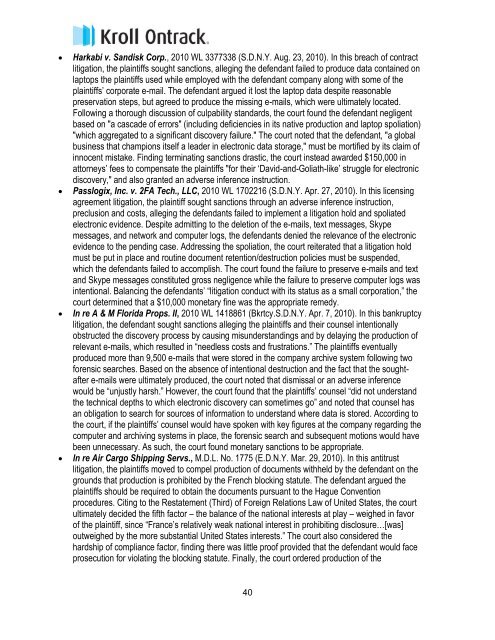Electronic Discovery and Computer Forensics Case List - Kroll Ontrack
Electronic Discovery and Computer Forensics Case List - Kroll Ontrack
Electronic Discovery and Computer Forensics Case List - Kroll Ontrack
You also want an ePaper? Increase the reach of your titles
YUMPU automatically turns print PDFs into web optimized ePapers that Google loves.
� Harkabi v. S<strong>and</strong>isk Corp., 2010 WL 3377338 (S.D.N.Y. Aug. 23, 2010). In this breach of contract<br />
litigation, the plaintiffs sought sanctions, alleging the defendant failed to produce data contained on<br />
laptops the plaintiffs used while employed with the defendant company along with some of the<br />
plaintiffs’ corporate e-mail. The defendant argued it lost the laptop data despite reasonable<br />
preservation steps, but agreed to produce the missing e-mails, which were ultimately located.<br />
Following a thorough discussion of culpability st<strong>and</strong>ards, the court found the defendant negligent<br />
based on "a cascade of errors" (including deficiencies in its native production <strong>and</strong> laptop spoliation)<br />
"which aggregated to a significant discovery failure." The court noted that the defendant, "a global<br />
business that champions itself a leader in electronic data storage," must be mortified by its claim of<br />
innocent mistake. Finding terminating sanctions drastic, the court instead awarded $150,000 in<br />
attorneys’ fees to compensate the plaintiffs "for their ‘David-<strong>and</strong>-Goliath-like’ struggle for electronic<br />
discovery," <strong>and</strong> also granted an adverse inference instruction.<br />
� Passlogix, Inc. v. 2FA Tech., LLC, 2010 WL 1702216 (S.D.N.Y. Apr. 27, 2010). In this licensing<br />
agreement litigation, the plaintiff sought sanctions through an adverse inference instruction,<br />
preclusion <strong>and</strong> costs, alleging the defendants failed to implement a litigation hold <strong>and</strong> spoliated<br />
electronic evidence. Despite admitting to the deletion of the e-mails, text messages, Skype<br />
messages, <strong>and</strong> network <strong>and</strong> computer logs, the defendants denied the relevance of the electronic<br />
evidence to the pending case. Addressing the spoliation, the court reiterated that a litigation hold<br />
must be put in place <strong>and</strong> routine document retention/destruction policies must be suspended,<br />
which the defendants failed to accomplish. The court found the failure to preserve e-mails <strong>and</strong> text<br />
<strong>and</strong> Skype messages constituted gross negligence while the failure to preserve computer logs was<br />
intentional. Balancing the defendants’ “litigation conduct with its status as a small corporation,” the<br />
court determined that a $10,000 monetary fine was the appropriate remedy.<br />
� In re A & M Florida Props. II, 2010 WL 1418861 (Bkrtcy.S.D.N.Y. Apr. 7, 2010). In this bankruptcy<br />
litigation, the defendant sought sanctions alleging the plaintiffs <strong>and</strong> their counsel intentionally<br />
obstructed the discovery process by causing misunderst<strong>and</strong>ings <strong>and</strong> by delaying the production of<br />
relevant e-mails, which resulted in “needless costs <strong>and</strong> frustrations.” The plaintiffs eventually<br />
produced more than 9,500 e-mails that were stored in the company archive system following two<br />
forensic searches. Based on the absence of intentional destruction <strong>and</strong> the fact that the soughtafter<br />
e-mails were ultimately produced, the court noted that dismissal or an adverse inference<br />
would be “unjustly harsh.” However, the court found that the plaintiffs’ counsel “did not underst<strong>and</strong><br />
the technical depths to which electronic discovery can sometimes go” <strong>and</strong> noted that counsel has<br />
an obligation to search for sources of information to underst<strong>and</strong> where data is stored. According to<br />
the court, if the plaintiffs’ counsel would have spoken with key figures at the company regarding the<br />
computer <strong>and</strong> archiving systems in place, the forensic search <strong>and</strong> subsequent motions would have<br />
been unnecessary. As such, the court found monetary sanctions to be appropriate.<br />
� In re Air Cargo Shipping Servs., M.D.L. No. 1775 (E.D.N.Y. Mar. 29, 2010). In this antitrust<br />
litigation, the plaintiffs moved to compel production of documents withheld by the defendant on the<br />
grounds that production is prohibited by the French blocking statute. The defendant argued the<br />
plaintiffs should be required to obtain the documents pursuant to the Hague Convention<br />
procedures. Citing to the Restatement (Third) of Foreign Relations Law of United States, the court<br />
ultimately decided the fifth factor – the balance of the national interests at play – weighed in favor<br />
of the plaintiff, since “France’s relatively weak national interest in prohibiting disclosure…[was]<br />
outweighed by the more substantial United States interests.” The court also considered the<br />
hardship of compliance factor, finding there was little proof provided that the defendant would face<br />
prosecution for violating the blocking statute. Finally, the court ordered production of the<br />
40

















